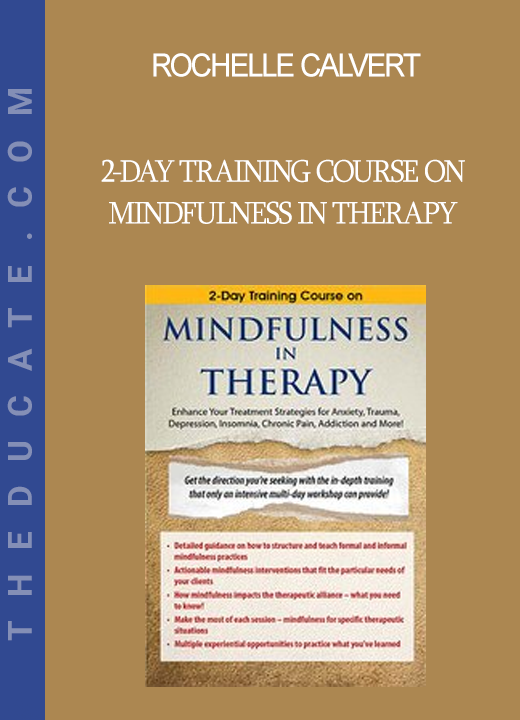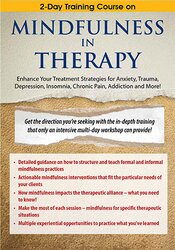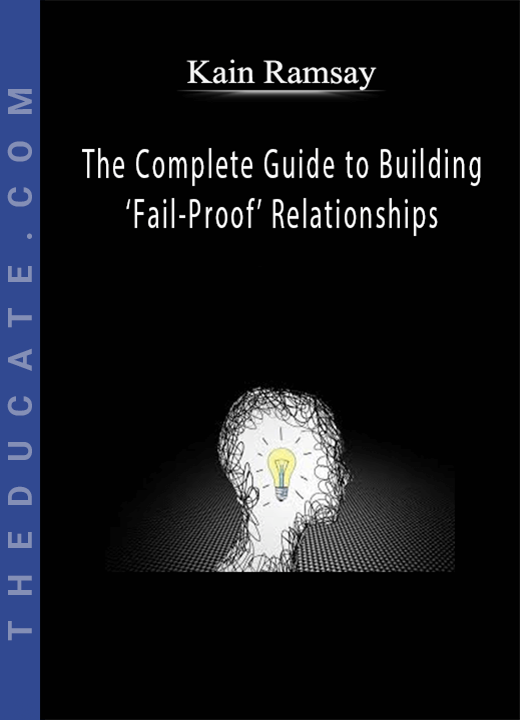Description
Rochelle Calvert – 2-Day Training Course on Mindfulness in Therapy: Enhance Your Treatment Strategies for Anxiety, Trauma, Depression, Insomnia, Chronic Pain, Addiction and More!
- Faculty:
- Rochelle Calvert
- Duration:
- 12 Hours 44 Minutes
- Format:
- Audio and Video
- Copyright:
- Jul 26, 2018
Description
Sometimes the only thing standing between us and our goals is a bit of direction. This is as true for us as clinicians, as it is for our clients. You’ve had exposure to mindfulness. You’ve read the articles and taken the one-day classes. You know the benefits, but you’re looking for more. More answers to your specific questions on how to establish a mindfulness practice in your clinical work. More direction on how to integrate mindfulness into your treatment plans for specific disorders including anxiety, depression, trauma and addiction. More practice, guidance, and feedback on utilizing mindfulness in specific therapeutic situations.
But how will you reach your goal of bringing this safe, powerful, and clinically effective tool into your sessions? Watch this Course and get the direction you’re seeking with the in-depth training that only a multi-day workshop can provide!
This program will answer your questions on the logistics of organizing and leading a mindfulness practice with clients, train you to effectively use numerous core and advanced mindfulness skills, and provide detailed instruction on incorporating them into your treatment plans for specific mental health disorders.
Full of real-life case examples, this experiential workshop will also provide you with the opportunity to practice the mindfulness skills you learn, giving you the confidence and competence you need to utilize them in your very next session!
Key Benefits of Watching:
- Add new dimensions to your treatment plans for anxiety, depression, PTSD, sleep, pain, addiction, and more
- Instruction and interactive demonstrations on specific mindfulness techniques and interventions
- Learn to structure and lead group mindfulness sessions with exercises and tips on space and time
- Make the most of each session – mindfulness for specific therapeutic situations
- Multiple experiential opportunities to practice
- Receive supportive feedback to grow the skills needed to teach mindfulness in session
Handouts
| Manual – 2-Day Training Course on Mindfulness in Therapy: Enhance Your Treatment Strategies for Anxiety, Trauma, Depression, Insomnia, Chronic Pain, Addiction and More! (8.7 MB) | 60 Pages | Available after Purchase |
Outline
Further Know Mindfulness: Know What You Teach and Teach What You Know
- How personal practice informs your teaching
- The four foundations of mindfulness
- Develop and deepen personal daily mindfulness practice
- How to use community support and learning
The Therapeutic Relationship: Use Mindfulness to Build Trust and Connection with Your Clients
- Improvement in clinical attention
- Affect regulation – therapist and client
- Empathetic connection with client
- Compassion fatigue/compassionate presence
- Being present in session to support change
- Build clients trust in themselves
Psychoeducation Techniques: Enhance Client Understanding and Motivation
- What Mindfulness is … and what it is not
- Mindfulness vocabulary
- Explain mindfulness through different modalities-visually, metaphorically, poetry
- Motivate clients with explanations of neuroplasticity and change
- Reacting vs responding – turn off the automatic pilot
- Empirical support for mindfulness, improved symptomology, and well-being
- Medical/health
- Education/learning
- Behavior/psychological
- Relational
Group Therapy vs. Individual Sessions: Create Effective Therapeutic Environments
- Types of mindfulness-based group programs
- Group emotional resonance
- Considerations on space and time
- Mindfulness directly applied in the one to one clinical session
- Personalize the practice – determine which format is best for your client
- Seize the opportunity of the individual session
- Understand situations that may contraindicate applying mindfulness in session
Formal Mindfulness Practices: Answers to Your Logistical Questions
- Embodiment of mindfulness
- Offering options for posture, range of experience and types of practice that best support client
- Use of language that promotes clarity and understanding of mindfulness
- Form of leading the practice
- Leading inquiry-questions to support deepening client experience of mindfulness
Creative Opportunities for Mindfulness in Life: Informal Mindfulness Practices
- Mindful daily moments
- Brief practices for day to day activity
- Learn ways to creatively adapt everyday mindfulness practices for your client
Mindfulness in Session: Keys to Starting and Sustaining Change
- Applying the foundations of mindfulness
- Using reactivity/patterns to assist in sustainable change
- Identifying common barriers and techniques
- Teaching the “antidotes” to suffering
How to Integrate Mindfulness Into Your Treatment Plans For:
- Anxiety
- Relax the arousal state – meditation vs. medication
- Reduce anxious thoughts with focus on the body
- 3-minute breathing practice
- Mindful walking practice: how to get started
- Insomnia
- Diaphragmatic breathing to improve sleep
- Calm the mind to fight insomnia
- Mindful practice with technology
- Depression
- Manage negative self-talk with awareness of thought
- Awareness practice – cope with limited energy
- Nature and well-being
- Trauma
- Grounding/orienting
- Body awareness-somatic movement
- RAIN practice
- Chronic Pain
- The latest research on mindfulness and persistent pain
- Awareness and acceptance of present experience
- Pain related anxiety
- Eating Disorders
- Mindful eating and self-control
- Sense awareness
- Types of hunger – eating awareness and skillful responding
- Addiction
- Mindful awareness of triggers and relapse prevention
- Urge surfing: mindfulness to cope with urges
- Taking in the good – noticing the good events in life
- ADHD
- Concentration and focusing practices
- Mindful movement
- STOP practices
Ongoing Mindfulness: Assessment, Growth and Support
- Assess how practices are working for the client
- Adapt, create, modify to grow the path of practice for your client’s unique needs
- Develop sustainable change with mindfulness
Limitations of the Research and Potential Risks
- Safeguards when teaching mindfulness
- Acuity and vulnerability of disorders
- Considerations and recommendations
Faculty
Rochelle Calvert, Ph.D., B.C.B.A.-DRelated seminars and products: 5
New Mindful Life
Rochelle Calvert (Voth), Ph.D., CMT, SEP, BCBA, is the founder of New Mindful Life. She has studied mindfulness for the past 16 years and has taught classes, courses, workshops and retreats. Rochelle leads classes/courses/seminars in Six-week Introductory Training in Mindfulness, (S.I.T.), Awake in the Wild- Nature-Based Mindfulness retreats, Mindfulness-Based Stress Reduction (MBSR), Mindfulness Based Cognitive Therapy (MBCT), Mindfulness Based Eating, Mindful Parenting and Mindful Workplace. She also facilitates professional trainings in mindfulness for clinicians and travels the country teaching seminars for PESI. She also works as clinical psychologist in private practice in San Diego.
Rochelle offers mindfulness, nature-based therapy and somatic experiencing as a psychologist with New Mindful Life. Her therapeutic approach includes teaching people individual mindfulness meditations – both indoors and outdoors – specific to their unique concerns to support healing. She also integrates somatic experiencing healing (body-based healing through nervous system reorganization) with the mindfulness and nature-based meditation practices. Rochelle has therapeutic specialty areas of training to support integration of these services to individuals struggling with life transitions, depression, anxiety, PTSD, pain conditions, eating disorders, as well as families of developmentally delayed children/adults.
Speaker Disclosures:
Financial: Rochelle Calvert is in private practice. She receives a speaking honorarium from PESI, Inc.
Non-financial: Rochelle Calvert is a member of the American Psychological Association; and the Association for Behavior Analysis.







Reviews
There are no reviews yet.